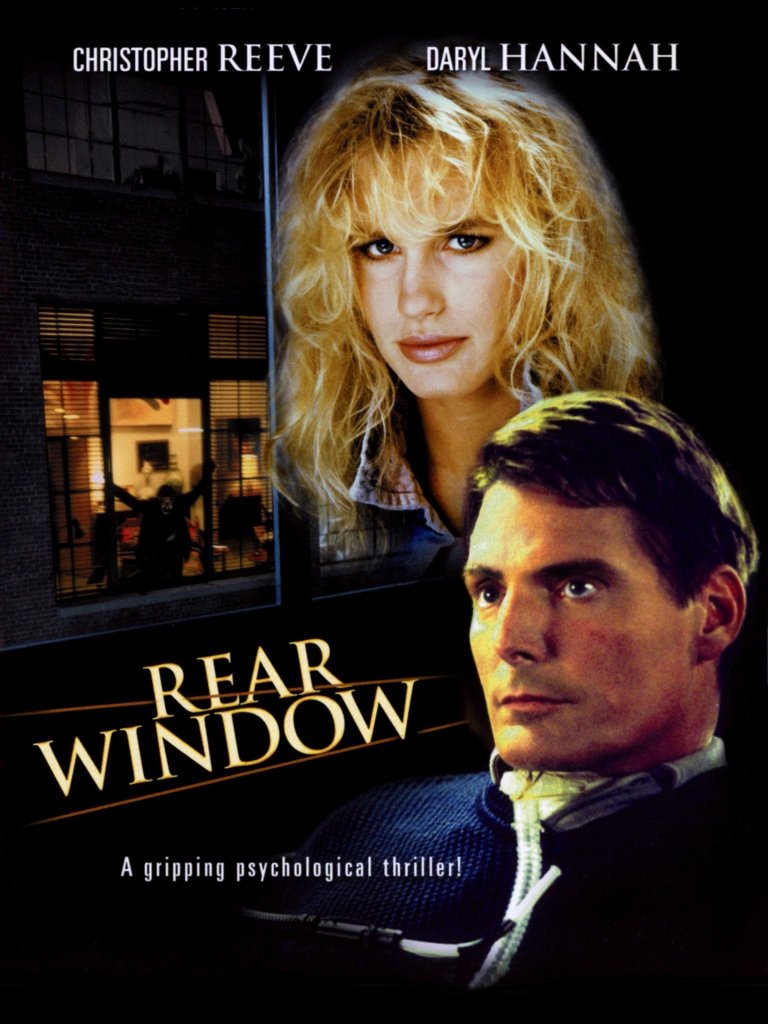In a decade bursting with mediocre remakes of Alfred Hitchcock classics, Dave pinpoints one well worth rediscovering.
In the content hungry realm of ‘90s television, a remake of an Alfred Hitchcock film was a familiar concept, albeit one that reinforced the impeccable nature of the originals. Shadow of a Doubt (1943), Notorious (1946), and Rebecca (1940) were all faithfully redone in 1991, 1992, and 1997 respectively, while others – like Tommy Lee Wallace’s woman-centric spin on Strangers on a Train (1951), Once You Meet a Stranger (1996) – offered the occasional tweak.
Christopher Reeve’s reason for entering such perilous territory is the most noble. On 27th May 1995 the Superman (1978) star fell from a horse and shattered his first and second vertebrae. The injury paralysed him from the neck down and left him unable to breathe without a ventilator. Quite how Reeve managed to summon the strength for rehabilitation – and, in turn, get himself back in front of the camera – is extraordinary. Not only that, but by choosing REAR WINDOW for his comeback, he selected the perfect vehicle to play to his newfound strengths and succeeded in making a justifiable version of a masterpiece.
“We wanted to create something exciting that forges new ground,” the actor told TV Week ahead of Rear Window‘s premiere on ABC in November ’98. “The idea was to raise the stakes. The main character in the first film has a broken leg. To do this story with a C2 vent-dependent quadriplegic puts the character in much more jeopardy. Many times disabled people are shown in a somewhat pathetic light, or they’re bitter and angry. This character, though, is so much more positive – a resourceful man who’s been through the ringer. This movie shows how far someone can come in reclaiming their life.” [1]
The principal lead of Jeffries, who spanned Cornell Woolrich’s short story and Hitchcock’s adaptation, has evolved into Jason Kemp: an architect who, in the wake of a car crash, is confined to a wheelchair. Having tailored his three-storey apartment to suit his high dependency needs, Kemp must switch to a lifestyle a world away from the frenetic one he left behind. Complicating his adjustment is a voyeuristic streak; a means to pass the time that’s amplified when Kemp convinces himself that he’s witnessed a murder in the dwelling across from his own. Claudia Henderson (Daryl Hannah), a work colleague he’s growing close to, seems to support his suspicions – but the sympathetic yet cynical Det. Moore (Robert Forster) may yet need some convincing…
This version of Rear Window has a great deal to like about it. Does it come close to reaching the heights of Hitch? Of course not. Director Jeff Bleckner’s valiant efforts fall far short of the technical and artistic brilliance of the 1954 picture, but as a tense thriller with a lead in a ground-breaking scenario, it’s a winner.
Reeve was bestowed with all kinds of praise upon its small screen debut. It’s deserved acclaim too, not just commiseratory lip service. He’s excellent: playful yet sincere, and indefatigable about what he can and what he’s going to do. There’s also room for a few political digs (“Do you have any idea how expensive it is to be disabled in this country?”) in among the tension, and a bunch of dryly delivered wisecracks.
Perhaps the most impressive aspect is how Reeve goes toe to toe in his apartment with the potential killer. It’s a genuinely gripping moment choreographed with impeccable precision (the cutting of his air supply tube will literally leave you gasping), and it encapsulates just how far the actor pushed himself to get each shot.
Overshadowed by the pointlessness of Gus Van Sant’s Psycho (1998) upon release, Rear Window deserves another look.
USA ● 1998 ● Thriller, TVM ● 89mins
Christopher Reeve, Daryl Hannah, Robert Forster, Ruben Santiago-Hudson ● Dir. Jeff Bleckner ● Wri. Larry Gross and Eric Ellis Overmyer, based upon the short story It Had to Be Murder by Cornell Woolrich

[1] A Conversation with Christopher Reeve, TV Week, November 14 – 20, 1998.

